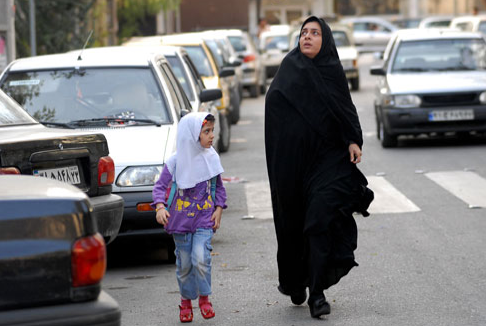Michael C. checking in with some of the aftermath of Oscar 2012. According to a report on Huffington Post, despite having previously trumpeted A Separation's Oscar win as a national triumph Iranian authorities have canceled an event to be hosted by leading Iranian film groups in honor of Asghar Farhadi's contribution to the country's cinema. Apparently, conservative hardliners and clerics, who had been celebrating Iran's first Oscar win, in particular its victory over the Israeli nominee, were displeased after being belatedly clued into the film’s content.
So why the about-face at this late date? What subversive material somehow slipped the attention of the authorities only now to come to light? What is so controversial about A Separation?

Honestly, I was surprised Iran submitted A Separation for the Oscar at all. The image of modern day Iran in Farhadi’s film wasn’t as devastating as say, the corruption and violence ravaged country portrayed in Mexico’s submission, Miss Bala, but it is still a far cry from the picture one imagines controlling government officials would be eager to present to the world. [more after the jump]
 Add to this that Farhadi is no darling of the Iranian government. At one point he was banned from making the film at all over a controversial speech he made that called for the return of politically exiled filmmakers. Throw in that production was only completed with an infusion of US dollars from the Motion Picture Association's APSA Academy Film Fund, and one would not have been surprised to see A Separation passed over for a more innocuous choice.
Add to this that Farhadi is no darling of the Iranian government. At one point he was banned from making the film at all over a controversial speech he made that called for the return of politically exiled filmmakers. Throw in that production was only completed with an infusion of US dollars from the Motion Picture Association's APSA Academy Film Fund, and one would not have been surprised to see A Separation passed over for a more innocuous choice.
That said, the sensible answer to "What’s controversial about A Separation?" is "Not a damn thing." It is controversial only so far as human imperfection is controversial. All the characters are trying to do what they believe to be the right thing regardless of their class, age or religion, right down to the judge who is tasked with making sense of the whole mess. To any rational person, it is no more a bruising indictment of Iran than Kramer vs. Kramer is a takedown of America.
Of course I’m not so naïve as to miss what it is that bothers the hard-line Iranian authorities. A Separation is blatant about the desire of many Iranians to leave the country, and looks unflinchingly at gender and class inequality, the cost of religious fundamentalism on every day life and the limitations of the Iranian legal system. It is a film full of shades of grey, and complexity has always been the enemy of the propagandist who prefers the world to be portrayed in black and white simplicity, good and bad, us vs. them.
What is ironic about this, apart from the fact that attempts to hide flaws in their society only serves to make them look weaker, is that in their narrow-minded effort to protect their national pride those officials miss the fact that A Separation represents a huge, positive step forward in the way the world views the Iranian people. At a time where it is increasingly easy to caricature all Iranians as hostile, violent religious zealots Farhadi gives us a humanist portrait that is more relatable than the vast majority of Hollywood films.
 The cast of A Separation listening to Farhadi's acceptance speech
The cast of A Separation listening to Farhadi's acceptance speech
Farhadi emphasized this distinction between the Iranian people and the dire political climate in his memorable Oscar speech:
At this time, many Iranians all over the world are watching us, and I imagine them to be very happy. They are happy not just because of an important award, or a film, or a filmmaker, but because -- at a time of tug of war, intimidation and aggressions exchanged between politicians -- the name of their county, Iran, is spoken here through her glorious culture, a rich and ancient culture that has been hidden under the heavy dust of politics.
 What is even more ironic is that these authorities saw fit to trumpet the Oscar win as a show of Iranian pride in the first place considering that doing so places value one of the most prestigious of Western honors, and the fact that Hollywood was fair-minded enough to present the award to A Separation flatly contradicts stereotypes about Israel’s expansive influence over America. But then irony has never been the strong suit of censors and bureaucrats, has it?
What is even more ironic is that these authorities saw fit to trumpet the Oscar win as a show of Iranian pride in the first place considering that doing so places value one of the most prestigious of Western honors, and the fact that Hollywood was fair-minded enough to present the award to A Separation flatly contradicts stereotypes about Israel’s expansive influence over America. But then irony has never been the strong suit of censors and bureaucrats, has it?

If anyone else have an insight on the situation for filmmakers in Iran, or if you have finally had the chance to see this masterpiece and want to gush, please share in the comments. You can read Michael C's previous thoughts on A Separation here or follow him on Twitter at @SeriousFilm